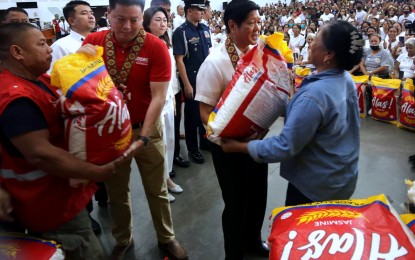
CAMPAIGN VS. HUNGER. President Ferdinand R. Marcos Jr. (2nd from right) oversees the distribution of sacks of premium quality rice to beneficiaries of the Pantawid Pamilyang Pilipino Program in Taguig City on Oct. 4, 2023. OCTA Research’s Tugon ng Masa survey from March 11 to 14, 2024 showed the country’s self-rated hunger decreased to 11 percent compared to 14 percent recorded in a similar survey held in the fourth quarter of 2023. (PNA file photo by Joan Bondoc)
MANILA – A recent OCTA Research survey showing a notable decrease in self-rated poverty and hunger among Filipino families is a clear indication that President Ferdinand R. Marcos Jr.’s anti-poverty programs and efforts are effectively reaching and improving the lives of Filipinos, Speaker Martin Romualdez said on Tuesday.
According to the Tugon ng Masa survey from March 11 to 14, 2024, the country's self-rated poverty is at 42 percent, which is a 3-percent lower compared to 45 percent recorded in a similar survey held in the fourth quarter of 2023.
In terms of self-rated hunger, the survey found that around 11 percent, or an estimated 2.9 million Filipino families, experienced involuntary hunger in the past three months. The March 2024 self-rated hunger figure is 3 percent lower than the recorded 14 percent, or around 3.7 million families, in the December 2023 survey.
“These figures represent a decline of approximately 800,000 families in both categories, a clear indication that the administration’s economic measures and anti-poverty efforts are effectively reaching and improving the lives of our people,” Romualdez said in a statement.
The Marcos administration’s anti-poverty efforts include the Pantawid Pamilyang Pilipino Program (4Ps), the DSWD’s Assistance to Individuals in Crisis Situation, the DOLE’s Tulong Panghanapbuhay sa ating Disadvantaged/Displaced Workers (TUPAD), and other programs such as free college education, free health insurance, and the grant of direct cash subsidies.
“This positive trajectory in reducing poverty and hunger underscores the impact of the government’s targeted policies aimed at enhancing economic stability and providing necessary support to the most vulnerable sectors. The decrease in the number of families who consider themselves food-poor further attests to the success of our food security programs,” Romualdez said.
He also highlighted the efforts of the House of Representatives, in collaboration with national government agencies, to complement the President’s programs, such as the Bagong Pilipinas Serbisyo Fair (BPSF), the Cash and Rice Distributions (CARD) program, the Start-up, Investment, Business Opportunity and Livelihood (SIBOL), and the Farmers Assistance for Recovery and Modernization (FARM).
The BPSF, which just concluded its 15th installment in Benguet province, is realizing President Marcos’ desire to bring government services closer to the people, including food, financial, and livelihood assistance to all 82 provinces across the country, he said.
The CARD Program, in collaboration with the Department of Social Welfare and Development (DSWD), continues to provide hundreds of thousands of beneficiaries with rice and cash assistance, with each beneficiary from vulnerable sectors receiving a 25-kilogram sack of rice and cash to help in everyday life.
Romualdez said the decline in self-rated poverty and hunger also showed that the efforts of both the administration of President Marcos and the House of Representatives to control inflation and increase household income are bearing fruit.
“These improvements in self-rated poverty and hunger are more than statistics – they represent real gains in the everyday lives of our kababayans (countrymen). Each percentage point decrease reflects thousands of families who now have better access to necessities and a more hopeful outlook on their future,” he said.
He assured that the House of Representatives will continue working with the Executive to further strengthen social programs, enhance economic opportunities, and ensure that economic growth is felt by every Filipino family across the nation.
“Together, we are making significant strides towards a poverty-free Philippines. Let us continue to support one another and work collectively to build a brighter and more prosperous future for all,” he said.
Stronger social protection programs
Department of Social Welfare and Development (DSWD) spokesperson Irene Dumlao said the survey proves that the government is on the right track in providing a whole-of-nation and whole-of-government approach in fighting hunger and poverty.
“We, in the DSWD, are happy with the survey results and will continue to strengthen our social protection programs to continue to improve the lives of our kababayans,” Dumlao said in a news release on Tuesday.
Aside from 4Ps, Dumlao cited the Walang Gutom 2027 (No Hunger in 2027): Food Stamp Program (FSP) which will scale up its implementation this July from 3,000 beneficiaries to 300,000 across the country.
The FSP is one of the priority programs of the Marcos administration that aims to fight involuntary hunger by providing food augmentation to the bottom 1 million households based on the Listahanan 3, who belong to the food-poor criteria as defined by the Philippine Statistics Authority (PSA).
The DSWD also partners with local government units (LGUs) in implementing the Supplementary Feeding Program (SFP), which provides nutritious snacks and hot meals to augment the regular meals of children enrolled in supervised neighborhood play (SNP) and child development centers (CDCs).
The DSWD, which chairs the Inter-Agency Task Force on Zero Hunger (IATF-ZH), and its partner-agencies will also continue to prioritize the implementation and monitoring of nutrition-specific and nutrition-sensitive programs to address food insecurity in the country. (with Zaldy De Layola/PNA)
